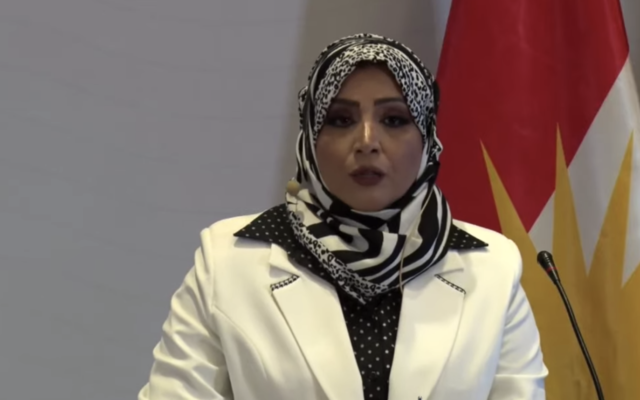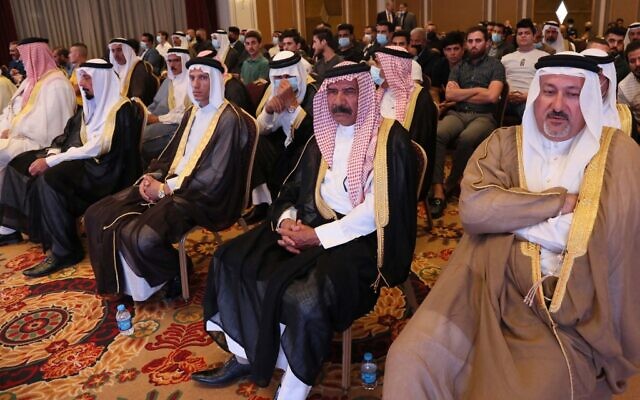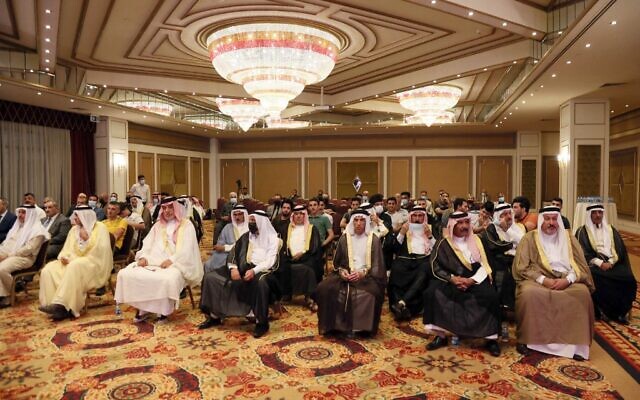Dr. Sahar Karim al-Ta’i, recently in running to become a minister, says she is ready to give it all for normalization: ‘We can live under repression or we can die with courage’

It is both necessary and inevitable that Iraq recognize Israel and join the Abraham Accords, Sahar Karim al-Ta’i, a senior official in Iraq’s Ministry of Culture, has told The Times of Israel in an interview.
Ta’i publicly expressed her views on Friday at a conference in Iraqi Kurdistan, in front of hundreds of Iraqi activists and tribal leaders who publicly backed peace with Israel. During her speech, she discussed the expulsion of the country’s Jews, the vast majority of whom fled Iraq for Israel amid rising persecution following the establishment of the Jewish state in 1948.
“They looked to Iraq, and are still looking to her, waiting for the eyes of their proverbial mother to show affection for her lost children,” she said. “They are still waiting for the moment when Israel is recognized by Iraq as their country and that of their brethren who share the country with them.”
Over 300 Iraqi tribal leaders and activists congregated in Erbil on Friday to call for normalization with Israel. The conference, organized by the New York-based Center for Peace Communications, caused a media firestorm in Iraq, with the country’s president attacking the gathering as “illegal.”
“Erbil must prevent these Zionist terrorist meetings. If not, the government must arrest all the participants,” said prominent Iraqi cleric Muqtada al-Sadr in response to Friday’s conference.
Ta’i, a Baghdad native who is currently senior research director at the Culture Ministry, was recently a prominent contender for a ministerial position. How did a veteran Iraqi official come to publicly back peace with Israel, a country with which Iraq is still officially at war?
It started with her parents, Ta’i told The Times of Israel just ahead of Friday’s conference. “I was raised in a family that instilled in us the principle of freedom of expression and freedom of conscience, that we should say what we feel and what we believe,” she said.

Though she lost her father as a child, she remembers him talking about his close friend, a successful Jewish businessman named Sassoon, who was forced to flee Iraq.
The friend offered Ta’i’s father his property instead of letting the government confiscate it. But her father refused to take what his friend had worked hard to acquire.
“I don’t believe this is the end of our friendship,” her father told his friend, according to Ta’i.
Ta’i grew up in an Iraq dominated by notorious dictator Saddam Hussein, who turned the country into one of the world’s most unfree states. But Ta’i, who often listened to foreign radio broadcasts, found out about the Holocaust from a French Middle East radio service — at a time when the Nazi genocide was a taboo subject in Iraq.
“I’ll never forget the time I first heard about the crime of the Holocaust, it brought me to tears,” she said.
Studying philosophy in college, she was particularly influenced by Jewish-American philosopher of science Thomas Kuhn, who wrote the landmark work, “The Structure of Scientific Revolutions.”
She and her late brother, a victim of terrorism, also developed a deep love for classical Iraqi Jewish vocalists.
Now that the United Arab Emirates, Bahrain, Morocco, and Sudan have agreed to normalize relations with Israel, Ta’i decided the time had come for Iraq as well.
“To pluck a ripe fruit, first you have to plant a seed, you have to water it, you have to wait for it to grow, then the flowers bloom, and then you know the fruit is coming,” she said. “The tree is big, and the flowers are already blooming, and soon we will pick the fruit of our labor.”
She also pointed to the COVID-19 pandemic as a catalyst for her public advocacy. “Coronavirus created an opportunity,” she said. “All of us are preoccupied with the same issues. Finally something happened that forced people to stop thinking about war, and start thinking about saving lives.”
Ta’i insisted that she was not afraid of any consequences for her personal safety.
“It is precisely because of these elements — terrorism, violence — that [it is] necessary to take a decisive step,” she stressed. “My family was not altogether relaxed about it, they worried about me, there are dangers to expressing these kinds of ideas, yet nonetheless this is my conviction and this is my decision.”
“We can live under the repression of terrorism or we can die with courage,” she said.

Ta’i believes that her advocacy, and that of her colleagues in the Erbil conference, will ultimately influence Iraqi policy.
“Certainly if a leadership figure should see a civilian, a woman in a country like Iraq, communicating this message with this boldness in front of the world, then surely those who are stronger, living within fortified walls, should be even more bold,” she said.
“Particularly today when there is the model of the UAE taking this type of very bold decision, then why should they not embrace this model that is now available?”
And if Iraq’s leaders do not act, Ta’i is ready to keep the pressure on.
“We will bring it out through public activism, things like the statements you are about to see, and more things of that nature, until that result is achieved,” she said.
As reported by The Times of Israel
